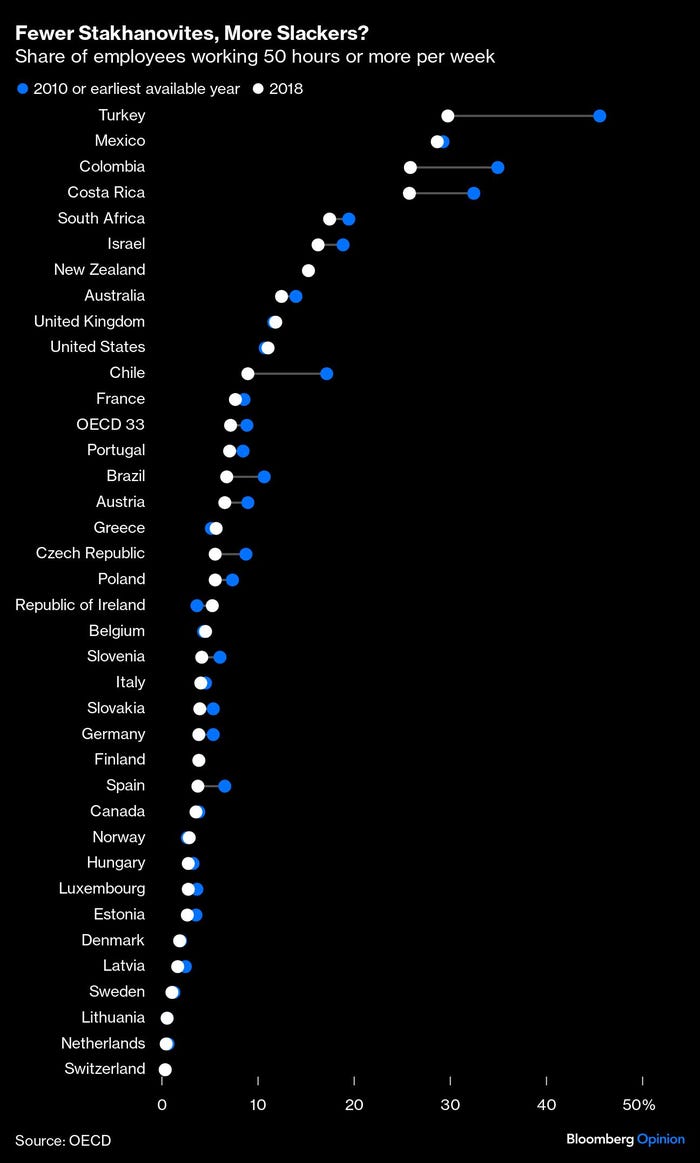The Epidemic of 'Overwork' Is a Dangerous IllusionThe Epidemic of 'Overwork' Is a Dangerous Illusion
Do we put in too many hours? And is hard work really such a bad thing? The answers to both these questions are much more interesting than the apostles of overwork suggest.
March 16, 2024

(Bloomberg Opinion/Adrian Wooldridge) — You have to admire how much hard work is going into persuading us that we work too hard. Malissa Clark of the University of Georgia has recently added a new book, Never Not Working: Why the Always-On Culture Is Bad for Business — and How to Fix It, to a pile that already includes: The Overworked American (Juliet Schor), Sleeping with Your Smartphone (Leslie Perlow), The Meritocracy Trap (Daniel Markovits) and the Workaholics Anonymous Book of Discovery, among many others.
Anxiety about overwork is having practical consequences. Starting with the European Union's 48-hour work directive in 2003, the majority of countries have introduced a maximum working time of 48 hours a week, and half have introduced a maximum of 40 hours. France, Italy, Spain, Belgium and Ireland have all introduced "right to disconnect" laws specifying hours when staff are not required to deal with emails. The global movement to shift to a four-day working week is gaining momentum. Many young Chinese people are so worried about their country's 996 work culture (9 to 9 six days a week) that they have started a "lying flat" movement, or "tang ping" in Chinese. "We employees are too tired. We have to lie down."
But are the likes of Malissa Clark right that we collectively put in too many hours? And is hard work really such a bad thing? The answers to both these questions are much more interesting than the apostles of overwork suggest.
The best economic data show that, on average, people are working fewer hours than ever. Working hours have declined the most in countries with higher GDPs because it takes fewer hours of work to earn a comfortable living. Housework is also much more efficient thanks to technology that now includes self-running vacuum cleaners and even lawnmowers. Most people have about 40 hours of free time a week. All those streaming platforms are doing a roaring trade for a reason.
The striking change is in the distribution of work rather than in the overall amount. A Harvard Business Review survey of "extreme jobs" in 2006 found that 62% of high earners work more than 50 hours a week, 35% work more than 60 hours and 10% work more than 80 hours, and there is little reason to think that life has got easier since then. Young investment bankers frequently work 80-120 hours a week (a standard joke is that the banker's 9-to-5 stretches from 9 a.m. to 5 a.m. the next morning).

The bulk of the gains in leisure time have been accrued by regular workers. Yale University's Daniel Markovits has calculated that in 1940 the typical worker in the bottom 60% by income worked nearly four more hours a week than the typical worker in the top 1%. By 2010, they were working 12 fewer hours. In addition, a growing number of people at the bottom of society, including more than 7 million American men, have dropped out of the labor force, many spending their time watching TV, playing video games and simply hanging out.
Nor are extreme working hours necessarily a problem. Elon Musk is right to argue that "you can't change the world on 40 hours a week." Extreme success usually requires extreme effort. Musk himself worked for 120 hours a week when he was building Tesla and often slept in the office. No detail was too small for him to obsess over. Honoré de Balzac regularly wrote from midnight until 8 a.m., fueled by innumerable cups of coffee, and once claimed to have worked for 48 hours in a row. As prime minister, Margaret Thatcher got up at 5 a.m. every morning, took a brief break to cook breakfast for her husband and children, and then worked for the rest of the day. The 1980s would have been different without her relentless drive and formidable grasp of detail.
Today's knowledge-workers must work harder than their predecessors for the simple reason that there is so much more knowledge to absorb. Young professors have to read more papers (the average age of Nobel Prize winners is rising and so is the size of teams involved in doing the research). Young lawyers must absorb more case law. Young bankers must command more recondite techniques. It is possible that AI will eventually reduce the pressure on knowledge workers, but so far, technological advances have had the opposite effect, increasing the tempo and complexity of transactions.
For some all this work may be a terrible burden. Yet for many others it is a pleasure: The more work becomes a vocation rather than a chore, the more people will be inclined to work long hours not because they are forced to but because they want to. Most academics choose their profession because they enjoy what they are doing. The same may be true of plenty of professionals, not least journalists, artists and other creatives. The innumerable hours they work often fly past because they get into the "flow" of intense concentration (another reason why all those emails and instant messages are a problem). And the more they work over the years, the more they gain a sense of mastering difficult subjects or creating something unique.
Entrepreneurs also have no choice but to work harder than regular salarymen and women. It is fashionable to criticize Amazon.com Inc. for its extreme work culture. (Jeff Bezos once told a group of shareholders that you "can work long, hard or smart, but at Amazon.com you can't choose just two out of three.") But we should not forget that Bezos built a great company from nothing — and revolutionized a mature industry in the process. It is also fashionable in some quarters to decry America's culture of hard work compared with, say, Europe's more relaxed attitude. Only one EU company worth more than $100 billion, Germany's SAP AG, has been founded in the past half-century compared with 27 in the US, including most of the companies that are defining the future.
This is not to say that there are no problems with working habits. Some people find it impossible to relax. There are a handful of tragic cases of people, particularly interns and new recruits, working themselves to death. Still, in general, the problem is far more subtle than the theorists of overwork suggest.
The problem of "overwork" is surely context-dependent. There is nothing wrong with young people working every hour God sends if they are unencumbered with family responsibilities and determined to make a name for themselves. But a similar commitment to work can be a problem if it means neglecting their children. There is nothing wrong with a start-up expecting its young employees to sleep under their desks to meet a deadline. But mature companies need a more sedate approach if they are to thrive in the long-term.
What looks like "overwork" often turns out to be the poor management of work instead. Some employers make the mistake of confounding "busyness" with productivity. They demand "facetime" from their employees regardless of whether they are being productive or not. An example-packed book, Empty Labor, by Roland Paulsen of Sweden's Lund University suggests that workers respond to such demands by skiving. The average worker devotes between one-and-a-half to three hours a day to pretending to work while in fact mooning around. (The classic technique, favored by this columnist, is to hang your jacket on the back of your chair and then disappear for a coffee and a wander.)
Some employers also demand that their employees are active on an ever-expanding number of platforms and channels. Parkinson's Law, coined in 1955 by C. Northcote Parkinson, states that "work expands to fill the time available for its completion." Today work expands to fill the channels available for its dissemination.
For their part, employees make the mistake of letting work invade their private lives rather than setting clear boundaries. They often engage in semi-work — checking their smart phones while having dinner with their families or dealing with their email while watching the TV. This problem is exacerbated by both mobile technology and working from home. Mobile technology creates what has been dubbed "the autonomy paradox": The more we can decide where we work, the more we end up working everywhere. "We're not working from home," says Andrew Barnes, the cofounder of 4 Day Week Global, "we're sleeping in the office." This blurring of the line between work and non-work means that we all too often get the worst of both worlds — neither concentrating fully nor relaxing properly.
There are plenty of voluntary ways of dealing with these problems, from doing a better job unplugging when you get home to having a heart-to-heart with your manager about the evils of Slack or midnight emails. But let us not allow the current hysteria about "overwork" to distract us, as a society, from the bigger problem of the number of people dropping out of the labor force. Enough people are lying flat already without more encouragement from management gurus. And let us not use it, particularly in Europe, as another excuse for creating yet more legislation about how much we can work. The last thing that growth-starved economies need is another excuse for taking a nap.
About the Author
You May Also Like








.jpg?width=700&auto=webp&quality=80&disable=upscale)
